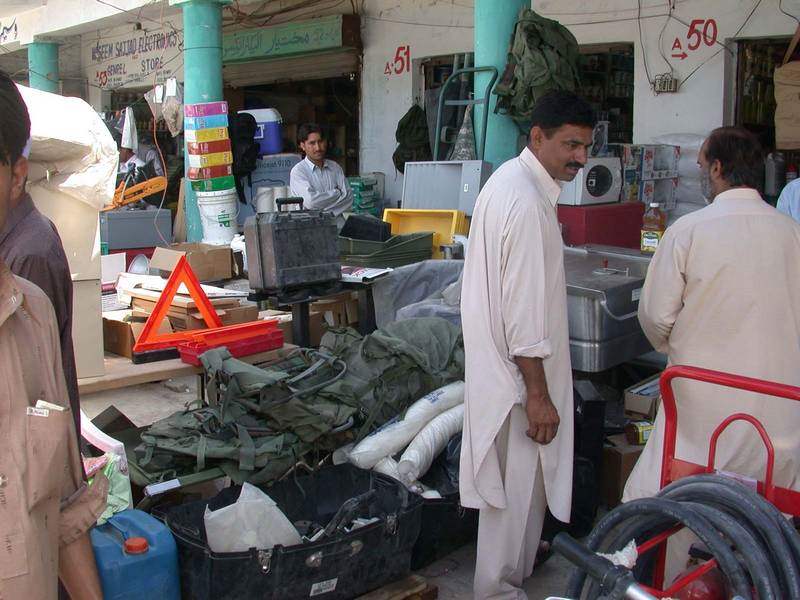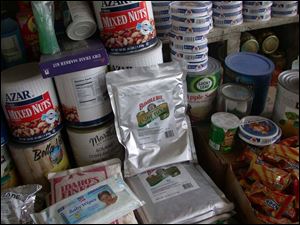
Stolen American goods bound for GIs in Afghanistan fill bazaars in Pakistan
6/11/2006
Like a giant flea market, shopes in the bazaar sell, among other items, inner tubes for bicycles, Styrofoam cups, backpacks, and even triangular orange hazard signs. Much of the merchandise smugglers steal off supply shipments to troops in Afghanistan.
FINAL OF TWO REPORTS
ON THE ROAD TO KHYBER PASS, Pakistan -Ten miles west of the frontier town of Peshawar on the road to Khyber Pass there is a collection of roadside commercial buildings commonly known as Bara Markets. These markets are just inside the tribal territory and hence outside the reach of Pakistani laws.
The buildings, some modern-looking three-story shopping arcades, others one-story, plain and shabby brick and cement structures, have one thing in common: They all sell smuggled merchandise, and people from all over the country flock to these markets to buy foreign goods at reasonable prices. The latest twist in this shadowy world of smuggling is the availability of merchandise that is meant for American forces in Afghanistan.
While walking in the market and taking occasional pictures, I was approached by two men with AK-47 assault rifles who asked me to accompany them. Being in tribal areas where at times people shoot first and ask questions later, I had no choice. I was led beyond the bustling market to an isolated gated compound and then into a well-appointed sitting area. There I was to wait the arrival of a man that oversees the running of the markets.
Tribal areas of Pakistan are the anomalous legacy of the British Raj. Historically the areas west of the Indus River, the present day tribal areas of Pakistan, had always been under the nominal control of the kings of Afghanistan. But in 1893 when the boundary between British India and Afghanistan was demarcated, these areas, because of their strategic importance, were incorporated within British India. But the tribes were allowed to retain a measure of autonomy where they govern themselves according to their own ancient tribal laws and customs. The relationship between the tribes and Islamabad has been that of an uneasy accommodation. Occasionally the tribes find themselves at odds with the government of Pakistan. In Waziristan, a few hundred miles south of here, the Pakistan army is locked in a bloody confrontation with al-Qaeda remnants and their tribal sympathizers. In comparison, thanks to the smuggling-related prosperity, this area is peaceful.
Not an unscrupulous newspaperman
Accompanied by armed bodyguards, Haji Qalandar Shah, the market boss, eventually showed up. A bearded, young man in his early 30s he was polite and courteous but inquisitive about my taking pictures of American merchandise in the shops. I assured him that I was doing that as a hobby. Would he be interested in looking at the pictures I took of these areas on my previous visits, I asked. The bluff worked.
He was concerned about the unscrupulous newspaper and television reporters who had given inaccurate reports about the American goods. His explanation was simple: The merchandise comes from Kabul, where it is sold in the American-sanctioned department stores. Satisfied that I was not an unscrupulous reporter snooping around and sniffing for a story, he apologized for the inconvenience and let me go.
It was certainly not a close call but could easily have been. Many years ago during my younger days, I found myself in a bitter confrontation with a shopkeeper over the sale of a Khyber knife. Timely intervention by another merchant on my behalf saved the day, and I walked out of that tense situation and wrote about it ("Guns of Darra Revisited": Toledo Magazine, The Blade, Sept. 18, 1988). In these areas, disagreements can turn into feuds and feuds, more often than not, are settled with the barrel of a gun.
Smuggling: time-tested and time-honored
Being a landlocked country, most of Afghanistan's imports pass through Pakistan. The goods are unloaded in the southern port city of Karachi and are then trucked to Afghanistan. No sooner do these goods cross into Afghanistan than they are shipped by human carriers and pack animals across the porous frontier into Pakistani tribal territory where they are sold openly in the markets.

A grocery shelf at a bazaar shop contains foil packets of tuna and other smuggled American goods.
The array of merchandise in these markets is amazing. From Japanese and Chinese electronics; to English wools and bone china; to plumbing supplies, bathroom fixtures, air conditioners, refrigerators, and racing bicycles. There are also genuine and fake watches and pirated and counterfeit music CD's and movie DVD's. The prices are reasonable because the merchants do not pay an import duty. For an additional 10 to 15 percent of the sale price, the merchandise can be delivered at to a buyer's home anywhere in the country.
Now the American presence in Afghanistan has brought an interesting twist: Some of the goods destined for American forces in Afghanistan ends up in these markets. While the bulk of the merchandise that is sold in these markets is legal, the availability of American goods is intriguing. How does American government-issued stuff end up in these markets? Or how do the secured containers in passage through Pakistan to Afghanistan spring such huge leaks?
Some of the merchants in the market, unlike their boss Qalandar Shah, were candid about the process. The American containers remain intact in their 1,200-mile journey from Karachi to Peshawar. At Peshawar the containers are placed on flat-bed trucks for the 270-mile ride to Kabul, where they have to pass through the tribal territory around Khyber Pass. This is where the containers are pilfered and merchandise is brought to these markets for sale. This was confirmed by government officials and also by Michael Spangler, the officer in charge of the American consulate in Peshawar.
And what a wide variety or merchandise one can find here. These storefront mini-Wal-Marts sell everything that one would find in American superstores. There are canned and packaged food items from pasta to tuna to nuts to breakfast cereals, all available at less than half the price that they would cost in the United States. There is government-issue office furniture, field telephones, folding shovels, vacuum cleaners, tents, cots, and portable chairs, the kind parents carry to their kids' games in the United States.
Competing for space on the same shelf are feminine-hygiene products and Handy Wipes with bags of rice and cans Idaho potatoes. And then there is the ubiquitous golf equipment that was destined for a country where there probably is only one golf course and that is too unsafe to swing a club.
In short, here in this bazaar one could equip a small army and have the fighting men and women live in style. No arms or ammunition is sold in these bazaars. For that, one has to go to the tribal bazaar at Dara Adam Khel 20 miles to the south.
American officials had in the past complained to Pakistani authorities about the theft but to no avail. The American diplomats have also met with the tribal leaders, and the leaders were sworn to stop the pilferage but that has not happened. Promises and loyalties in these mountains are as fleeting and unpredictable as the shifting winds through the Khyber gorges.
It was, however, an eye opener to see our hard earned tax dollars making some unscrupulous tribesmen rich.
An emeritus professor of surgery at the Medical University of Ohio, S. Amjad Hussain is a columnist on the op-ed pages of The Blade. He was born in Peshawar, Pakistan, near the Khyber Pass and has for more than 30 years written about religion, culture, and politics in Pakistan, Afghanistan, and India.
Contact him at: aghaji@bex.net.